If you’re looking for the best whole milk for babies, it's crucial to do your research and be aware of the factors that determine what makes a good milk option for your little one's diet. As your child transitions from formula or breast milk to solid foods, finding a high-quality milk option is essential for their overall health and development.
When searching for the best whole milk for babies, it's important to consider factors such as the source of the milk, whether it's organic or not, as well as any additives or preservatives included. Additionally, look for milk with a high fat content as babies require this for proper development. Lastly, it is crucial to find a milk option that is easy to digest for little tummies.
When looking for the best whole milk for babies, you may have questions like "What are the best brands available?", "Are organic options better?", "Should I choose a low-fat option?", or "What are the nutritional benefits of whole milk for babies?". With so many options on the market, it can be overwhelming when trying to find the perfect fit for your baby's needs. Doing your research and making an informed decision can reassure you that you're making the best choice for your little one.
10 Best Whole Milk For Babies
| # | Product Image | Product Name | Product Notes | Check Price |
|---|---|---|---|---|
|
1
|
Ideal for those who prefer goat milk and need a powdered and vitamin D enriched option.
|
|
||
|
2
|
The product is ideal for toddlers who need an alternative to cow's milk or have trouble digesting lactose.
|
|
||
|
3
|
The product is ideal for people who want to consume natural and pure goat milk in an easy-to-use powder form.
|
|
||
|
4
|
This product is ideal for infants who require sensitive milk-based formula during their first stage of development.
|
|
||
|
5
|
This product is ideal for toddlers who are at least one year old and transitioning from breast milk or formula.
|
|
||
|
6
|
It is an ideal formula for toddlers and infants who require a nutrient-rich milk-based diet.
|
|
||
|
7
|
This product is ideal for those looking for a fortified dry whole milk in canisters.
|
|
||
|
8
|
It is an ideal formula for toddlers aged 12-36 months, made with fresh goat milk.
|
|
||
|
9
|
The product is ideal for toddlers who need a formula that provides necessary nutrients found in goat milk.
|
|
||
|
10
|
Ideal for those looking for a high-quality, non-GMO, grass-fed whole goat milk powder that is easy to digest.
|
|
1. Meyenberg Whole Powdered Goat Milk, Vitamin D, 12 Ounce
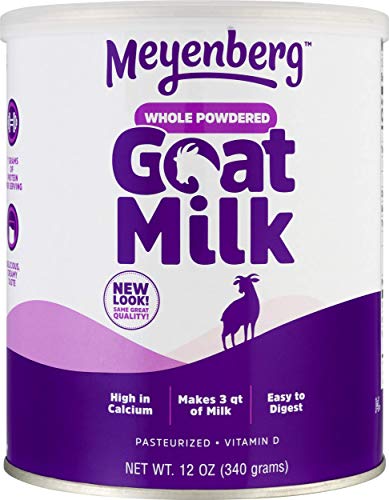
Looking for a natural milk alternative that is both nutritious and delicious? Look no further than this powdered goat milk fortified with folic acid and vitamin D. With a protein composition that is closest to breast milk, it is an ideal choice for infant supplementation, and it is also a great option for those who are sensitive to cow milk or soy products.
This powdered goat milk is high in calcium and low in sodium, making it a healthy choice for people of all ages. Plus, it is naturally gluten-free, so it is a great option for those with dietary restrictions.
Made in the USA, this powdered goat milk is a top-quality product that you can trust. It is easy to prepare and can be used in a variety of recipes, from smoothies to baked goods.
2. Kabrita Goat Milk Toddler Formula (6pk, 28oz Ea)
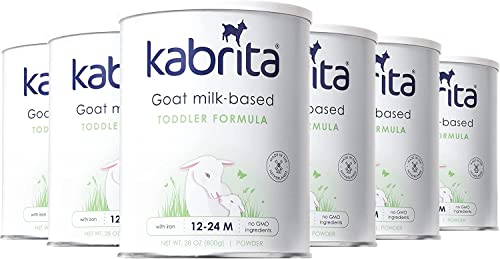
Looking for a toddler formula that is easy to digest and gentle on your little one's tummy? Look no further than Kabrita Goat Milk Toddler Formula. Made with premium Dutch goat milk, this formula is specially created for 12-24 month toddlers and is a great cow milk alternative for those who experience minor issues associated with cow milk consumption.
Kabrita's naturally A2 milk formula is fortified with 24 vitamins and minerals, including vitamin D, vitamin C, DHA, and iron, to support your growing child's nutritional needs. With its mild, sweet taste, Kabrita is a popular choice even among picky eaters.
Preparing Kabrita Goat Milk Toddler Formula is easy – simply follow the 1:1 ratio by adding 2 ounces of water for every 2 scoops of powder. Be sure to fill the bottle with water before adding any powder to ensure accurate measurement, as adding water to powder can over-concentrate any baby and toddler formula.
And if you have any questions or issues with Kabrita, their dedicated customer service team is always available to help. So why not try Kabrita Goat Milk Toddler Formula confidently and add it to your toddler essentials? Your little one will love it!
3. New Zealand Full Cream Goat Milk Powder (Natural) – 14oz
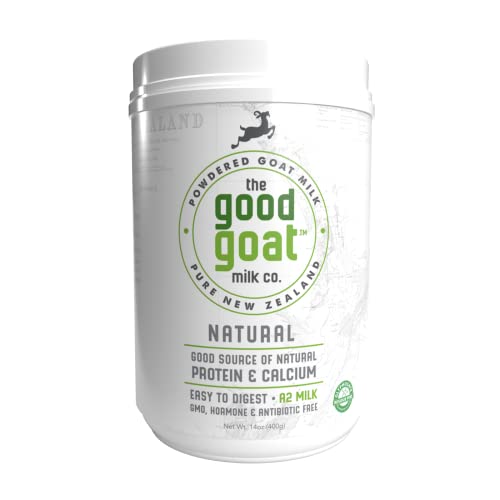
Introducing the Goat Milk Powder, a natural and healthy beverage option for adults and children aged 12 months and above. This powder is sourced from goats in New Zealand, who have access to the outdoors all year round and feed on natural pasture plants.
The goat milk powder is a natural source of protein and calcium, containing approximately 28% more calcium than cow's milk. It is also easier to digest due to the smaller fat globules and less alpha s1-casein than cow's milk. Additionally, it contains 89% less A1 Beta Casein and more A2 Beta Casein, which is believed to reduce digestive discomfort in some individuals.
One of the great things about this product is that it contains no additives. The natural goat milk powder has everything it needs to be a healthy beverage without any unnecessary ingredients. Additionally, it is GMO, hormone, and antibiotic-free, ensuring that you are consuming only the best and most natural product possible.
The Goat Milk Powder is an excellent option for those who are looking for a natural and healthy beverage. It is packed with essential nutrients, including protein and calcium, and is much easier to digest than cow's milk. The fact that it is sourced from goats in New Zealand who have access to the outdoors all year round and feed on natural pasture plants is a testament to the quality of the product. Overall, this is a great option for anyone looking to add a healthy, natural beverage to their diet.
4. Sensitive Milk-Based Infant Formula By Happy Baby
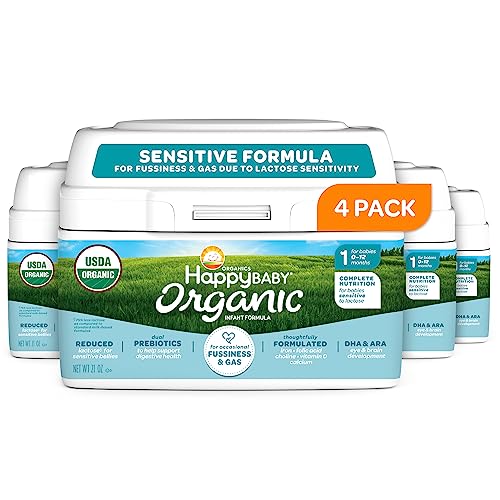
The Stage 1 Sensitive formula by Happy Baby is thoughtfully designed to cater to the needs of babies aged 0 to 12 months with sensitive bellies. This formula provides a complete nutrient blend with lactose reduced by 75%, easing occasional fussiness and gas in lactose-sensitive babies.
The Sensitive Stage 1 Formula also supports digestive health with a prebiotic mix (GOS & FOS) that mimics the function of prebiotics found in breast milk. These prebiotics act as food for beneficial gut bacteria, aiding in your baby's digestive process. Moreover, the formula is Non-GMO and Gluten-Free, ensuring a safe and healthy option for your little one.
Happy Baby offers an array of organic, delicious options for your baby's nutritional journey, including baby food pouches, organic cereals, teething wafers, baby snacks, and more. Happy Family Organics, the parent company, is on a mission to change the trajectory of children's health through nutrition. They provide age and stage-appropriate premium organic food products for babies, tots, kids, and mamas alike.
All Happy Baby products are certified USDA organic, made with non-GMO ingredients grown without the use of toxic persistent pesticides. Additionally, the packaging is made without BPA, BPS, or phthalates, ensuring that you can trust the safety and quality of the product.
5. Nido Kinder 1+ Toddler Powdered Milk – 56.4 Oz (3.52 Lb)
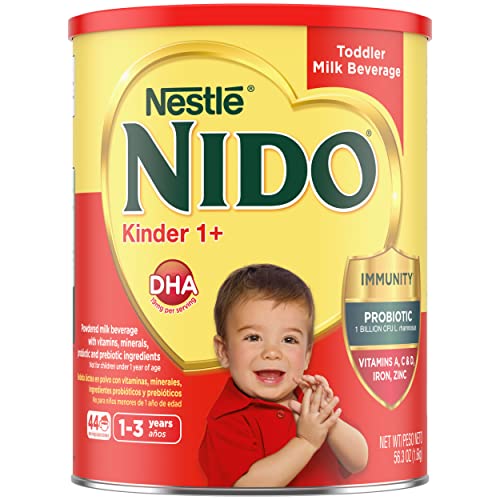
Introducing the Nestle NIDO Kinder 1+ Toddler Milk Beverage, a highly nutritious drink that is perfect for growing children. This 56.4 oz canister is SNAP and EBT eligible, making it accessible to families from all backgrounds.
Each cup of Nestle NIDO 1+ toddler drink is packed with 13 essential vitamins and minerals that are vital for your child's growth and development. This easy-to-mix beverage is a convenient way to provide your child with the nutrients they need.
The NIDO Kinder 1+ formula includes a probiotic, along with Vitamins A, C, D, Iron, Zinc, and more, to help support your child's immunity. Additionally, 19 mg Omega-3 DHA and Iron are included to help support healthy brain development.
Preparing the NIDO Kinder 1+ beverage is a breeze – simply stir 4 scoops of the powder into 1 cup of warm water. This will yield approximately 47 8-fluid ounce servings of milk, making it a cost-effective choice for families.
Every glass of Nestle NIDO 1+ helps support your child's healthy immune system with Vitamins A, C, and B6, as well as Iron and Zinc. Furthermore, NESTLE NIDO 1+ includes Prebio 1, an exclusive blend of fibers that supports digestive health.
One of the best things about NIDO 1+ is its delicious taste of honey, which kids will surely love. This toddler milk beverage is a great way to ensure that your child is receiving the nutrients they need, all while enjoying a tasty drink.
6. Holle Stage 3: Goat Milk Formula, 28 Oz
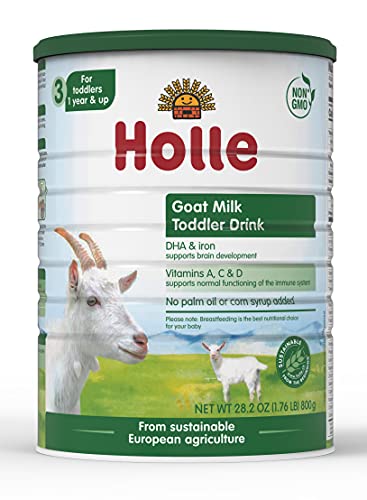
This product is made from whole EU-organic goat's milk, which has been proven to be easier for children to digest. It is free from GMOs and does not contain any artificial preservatives, corn syrup, or other unnatural ingredients. Additionally, it is vegetarian, soy-free, and gluten-free, making it suitable for a wide range of dietary needs.
This nutrient-complete formula contains healthy carbohydrates, fats, and micronutrients, providing your child with a well-rounded diet. It is perfect for children from 12 months of age to the end of their third year, and can be used as part of a mixed diet of bottle feeds and weaning.
With its high-quality ingredients and comprehensive nutritional profile, this product is an excellent choice for parents who want to ensure their child is getting the best possible start in life. Its organic, non-GMO formula is gentle on little tummies, while its absence of artificial ingredients gives parents peace of mind. Whether you're looking for a formula to supplement your child's diet or you're transitioning them to solid foods, this product is a great option.
7. Nido Fortificada Dry Whole Milk 56.4 Oz. Canisters
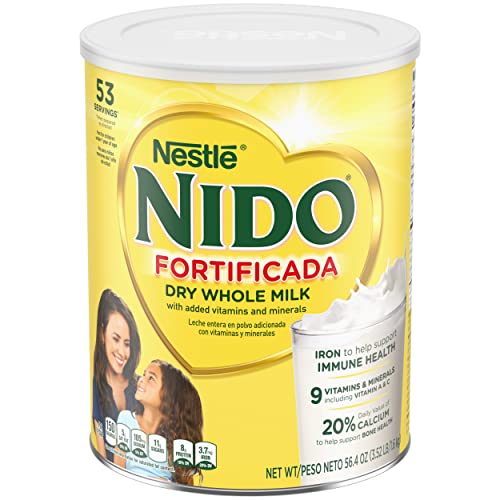
The Nestle NIDO Fortificada Dry Whole Milk Powdered Drink Mix is a highly nutritious and convenient drink mix that is perfect for the whole family. Each canister contains 56.4 oz (approximately 53 servings) of dry whole milk beverage that is easy to mix and enjoy.
This milk drink mix is a great source of 5 essential vitamins and minerals that are vital for maintaining good health. With calcium, zinc, Vitamin A, Vitamin C, and iron, the Nestle NIDO Fortificada powdered drink mix ensures that your body gets the necessary nutrients it needs in every cup.
To prepare this delicious and nutritious beverage, simply stir 4 tbsp of the NIDO Fortificada Dry Whole Milk beverage into 1 cup of warm water. It is easy to mix and can be enjoyed by everyone in the family.
The Nestle NIDO Fortificada Dry Whole Milk Powdered Drink Mix is SNAP and EBT eligible, making it accessible to families who require financial assistance. This drink mix is also ideal for those who want to stock up on a healthy and convenient beverage that can be stored for an extended period.
To ensure that your Nestle NIDO Fortificada remains fresh, store the canister in a cool, dry place. With its rich and creamy taste and high nutritional value, the Nestle NIDO Fortificada Dry Whole Milk Powdered Drink Mix is the perfect addition to your daily diet.
8. Aussie Bubs Goat Milk Toddler Formula
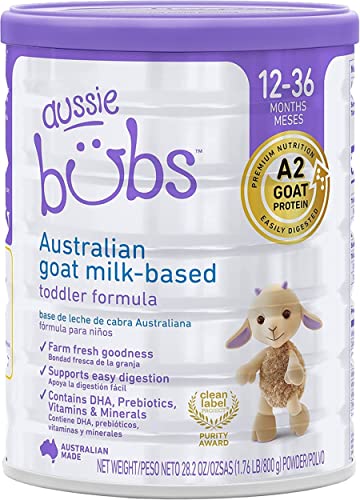
Introducing the Aussie Bubs Australian Goat Milk-based Toddler Formula, a specially formulated product designed for toddlers with sensitive tummies aged 12-36 months. This premium formula is a result of extensive research and is made to ensure safety, quality, purity, and nutrition.
The formula contains goat milk sourced from high-quality farmers. The milk contains A2 Goat Protein, which has a unique structure of proteins and fats that makes it easier for toddlers to digest. The purity of our milk is ensured, making it a pure and balanced source of nutrition for your little one.
Our product is non-GMO and free from artificial colors, flavors, and preservatives. It has been selected for the Clean Label Purity Award, making it a trustworthy, safe, and reliable option for parents looking for the best products for their children.
Aussie Bubs Toddler Formula is a good alternative for toddlers with sensitive tummies. It contains DHA, prebiotics, vitamins, and minerals, providing a complete source of nutrition for your little one. Our formula gives parents peace of mind, knowing that it is free from any hidden nasties and contains only pure and natural ingredients.
Founded by Kristy Carr, a mom of three, our formula has been trusted by parents for over 17 years. Kristy has a mission to inspire the next generation of happy babies with clean label nutritional products that provide the foundation for setting up a lifetime of good eating habits.
9. Kabrita Goat Milk Toddler Formula Powder, 28 Oz.
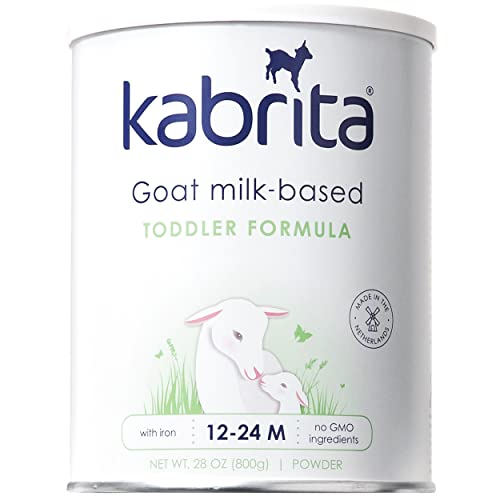
The Kabrita Goat Milk Toddler Formula is an excellent choice for parents looking for a premium formula for their 12-24 month (1 to 2-year-old) toddlers. Made with high-quality Dutch goat milk, this formula is gentle on sensitive tummies and easy to digest. This formula is perfect for supplementing, weaning, or changing formulas due to tummy troubles.
Kabrita Goat Milk Toddler Formula is a great cow milk alternative for children who experience minor issues associated with cow milk consumption. Its mild, sweet taste makes it a popular choice, even among picky eaters. The formula also uses an adapted whey-to-casein protein ratio, which makes it even more digestible.
This A2 goat milk formula is fortified with 24 vitamins and minerals, including vitamin D, vitamin C, DHA, iron, and much more. These important micronutrients support your growing child’s nutritional needs, making it an ideal choice for parents who want to ensure their toddlers are getting a balanced diet.
Preparing the Kabrita Goat Milk Toddler Formula is very easy. Just follow the simple 1:1 ratio by adding 2 ounces of water for every 2 scoops of powder. It is important to fill the bottle with water before adding any powder to ensure accurate measurement. Over-concentrating any baby and toddler formula can be harmful to your child's health.
At Kabrita, they have a dedicated customer service team who are always ready to answer any questions or address any issues you may have with their product. You can try Kabrita Goat Milk Toddler Formula confidently and add it to your toddler essentials. Overall, this formula is an excellent choice for parents looking for a high-quality formula that is easy to digest, gentle on sensitive tummies, and fortified with essential micronutrients.
10. Creamy Grass-Fed Goat Milk Powder – 1lb.
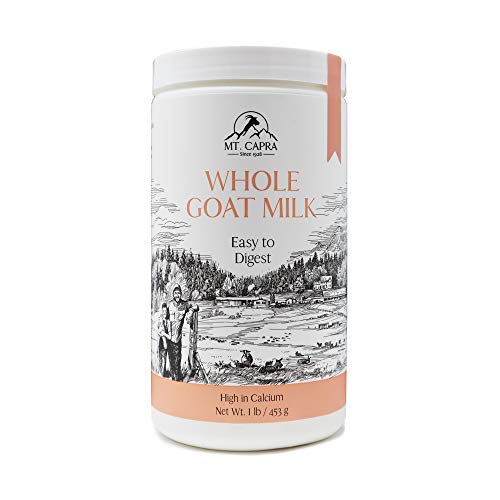
Looking for an alternative to cow or soy milk? Look no further than this easy-to-digest, low allergy powdered goat milk. With its high calcium content and delicious taste when mixed with water, this goat milk powder is a great choice for anyone looking to switch up their milk game.
Not only is it a tasty option, but it also has some great health benefits. Unlike cow milk, goat milk contains 89% less Alpha S1 Casein protein, which can be a trigger for some allergies. And if you're looking to avoid phytoestrogens, goat milk is an excellent alternative.
This powdered goat milk is the perfect ingredient for homemade recipes that call for goat milk. Plus, it's free from antibiotics, growth hormones, and chemicals, making it a great choice for anyone looking for a clean, natural option.
Best Whole Milk For Babies FAQs
Are there any risks associated with giving whole milk to babies?
Yes, there are certain risks associated with giving whole milk to babies. The American Academy of Pediatrics recommends that babies below the age of 1 year should not be given cow's milk as it does not contain the necessary nutrients required for their growth and development. Whole cow's milk is high in protein and minerals, which can overload a baby's immature kidneys and cause dehydration. Additionally, whole milk contains high levels of saturated fat, which can lead to obesity and other health concerns later in life. Babies who are given whole milk before the age of 1 year are also at risk of developing iron-deficiency anemia as they may not get enough iron from the milk. Instead, babies should be fed breast milk or formula until they are at least 1 year old, after which they can gradually transition to whole milk. It is recommended to consult with a pediatrician before introducing any new food or drink to a baby's diet.
Can whole milk cause digestive issues in babies?
Whole milk can cause digestive issues in babies. Whole milk contains a high amount of fat, which can be difficult for a baby's digestive system to handle. Infants under the age of 1 year should not be given whole cow's milk as their primary source of nutrition, as it does not contain the necessary nutrients for their growth and development. Additionally, babies may have difficulty digesting lactose, a sugar found in milk, which can lead to gas, bloating, and diarrhea. If a baby is experiencing digestive issues after consuming whole milk, it is best to speak with a pediatrician to determine the cause and appropriate treatment. In general, breast milk or formula is recommended for infants, and whole milk can be introduced gradually after the age of 1 year.
How do I transition my baby from formula or breast milk to whole milk?
The transition from formula or breast milk to whole milk is an important milestone for your baby’s nutrition and development. The process should be gradual and done over a few weeks to allow your baby to adjust to the new taste and digestion of whole milk.
Start by introducing whole milk slowly by mixing small amounts of it with their regular formula or breast milk. Increase the proportion of whole milk gradually, while decreasing the amount of formula or breast milk in each feeding. This gradual process will give your baby’s digestive system time to adjust to the new milk.
It is essential to offer whole milk in a cup, not a bottle, to encourage your baby to learn how to drink from a cup. Also, offer your baby whole milk at mealtime or snack time, so they begin to associate it with solid foods.
It is important to note that whole milk is high in fat and calories compared to formula or breast milk. Therefore, it is recommended to switch to whole milk after your baby turns one year old. If you have any concerns or questions, consult your pediatrician for advice.
How much whole milk should I give my baby?
The amount of whole milk you should give your baby depends on their age and nutritional needs. Typically, pediatricians recommend waiting until your baby is at least 12 months old before introducing whole milk into their diet. At this age, your baby can consume up to 2-3 servings of whole milk per day, with each serving consisting of 4-6 ounces.
However, it's important to note that every baby's nutritional needs are unique, so it's best to consult with your pediatrician to determine the appropriate amount of whole milk for your baby. Additionally, if your baby has any allergies or intolerances to dairy, your healthcare provider may recommend alternative milk sources or supplements. It's crucial to follow your baby's doctor's recommendations to ensure that they receive optimal nutrition for healthy growth and development.
Is organic whole milk better for babies?
Organic whole milk can be a good option for babies, but it's important to consider a few factors before making a decision. First, whole milk is not recommended for babies younger than 12 months old because it doesn't have the right balance of nutrients they need for their growth and development. Before 12 months, babies should only have breast milk or formula.
Once a baby is 12 months old, they can start having whole milk as part of their diet. Organic milk is made without antibiotics, hormones, and pesticides, which can be beneficial for babies. However, it's important to note that organic milk doesn't necessarily have more nutrients than regular milk.
When choosing milk for your baby, it's important to consider their overall diet and nutritional needs. While milk can be a good source of calcium and other important nutrients, it shouldn't be the only source. Make sure your baby is also getting a variety of fruits, vegetables, whole grains, and protein sources.
Ultimately, the decision to choose organic whole milk for your baby is up to you and your family's preferences and values. It's always a good idea to talk to your pediatrician before making any significant changes to your baby's diet.
Should I choose whole milk over other types of milk for my baby?
When it comes to choosing the right milk for your baby, it's important to consider their nutritional needs. While whole milk is a good source of fat and calories for growing babies, it may not be the best option for all infants.
For example, if your baby has a family history of obesity or heart disease, you may want to opt for a lower-fat milk instead. Additionally, babies with lactose intolerance or cow's milk allergy may need to avoid milk altogether or switch to a non-dairy alternative.
Ultimately, the decision of which milk to choose for your baby should be made in consultation with your pediatrician. They can provide guidance based on your baby's individual needs and make recommendations on the best type of milk to support their growth and development.
What are the benefits of giving whole milk to babies?
Whole milk is an excellent source of essential nutrients that a growing baby needs for healthy development. The benefits of giving whole milk to babies include:
1. Adequate fat intake: Whole milk contains higher amounts of fat, which helps in the proper growth of the baby's brain and nervous system.
2. Calcium and Vitamin D: These nutrients are crucial for the development of strong bones and teeth. Whole milk is an excellent source of both calcium and vitamin D.
3. Energy: Whole milk provides the energy that babies need to grow and develop. It is a good source of carbohydrates, protein, and fats.
4. Easy to digest: Whole milk is easily digestible, making it an ideal food for babies. It contains lactose, which is a sugar that helps in the absorption of calcium.
5. Cost-effective: Whole milk is a cost-effective option for parents as it is readily available and less expensive than other baby foods.
However, it is essential to note that whole milk should not be given to babies under the age of one year as it may cause digestive problems. After the age of one, whole milk can be introduced gradually into the baby's diet.
What are the best brands of whole milk for babies?
When it comes to choosing the best brand of whole milk for babies, there are a few factors to consider. Firstly, it's important to note that whole milk should only be given to babies over the age of 1, as before that age, their digestive systems are not yet able to handle the fat content in whole milk.
That being said, some of the top brands of whole milk for babies include organic options such as Horizon Organic, Organic Valley, and Stonyfield Organic. These brands prioritize the use of high-quality, organic ingredients and avoid the use of artificial growth hormones or antibiotics.
Other popular brands of whole milk for babies include DairyPure, Borden, and Hood, which are widely available and offer a dependable source of nutrition for growing infants. Ultimately, the best brand of whole milk for your baby will depend on your individual preferences and any specific dietary needs or restrictions that you may have. It's always a good idea to consult with your pediatrician before introducing whole milk to your baby's diet.
What is the nutritional value of whole milk for babies?
Whole milk is an excellent source of nutrients for babies, as it contains a variety of essential vitamins and minerals that are important for their growth and development. Some of the key nutrients found in whole milk include calcium, vitamin D, and protein. Calcium and vitamin D are essential for the development of strong bones and teeth, while protein is important for building and repairing tissues in the body.
In addition to these essential nutrients, whole milk also contains healthy fats that are important for brain development and overall growth. These fats can provide babies with the energy they need to stay active and healthy, while also supporting their immune system and overall health.
However, it’s important to note that whole milk should not be given to babies under the age of one year, as it can be difficult for their digestive systems to process. Instead, breast milk or formula is recommended for infants until they are old enough to handle solid foods and whole milk.
When can babies start drinking whole milk?
Babies can start drinking whole milk when they turn one year old. Before that, babies should be exclusively fed with breast milk or formula milk. After their first birthday, whole milk can be gradually introduced into their diet. Whole milk is a good source of calcium and vitamin D which are essential for the growth and development of bones and teeth. It is recommended to give babies whole milk instead of skim or low-fat milk as they need the extra fat for brain development. It is important to note that cow's milk should not be given to babies under one year old as their digestive system is not mature enough to digest the proteins and minerals in cow's milk. Moreover, excessive intake of cow's milk before the age of one can lead to iron deficiency anemia. Therefore, it is important to consult with a pediatrician before introducing whole milk to your baby's diet.

